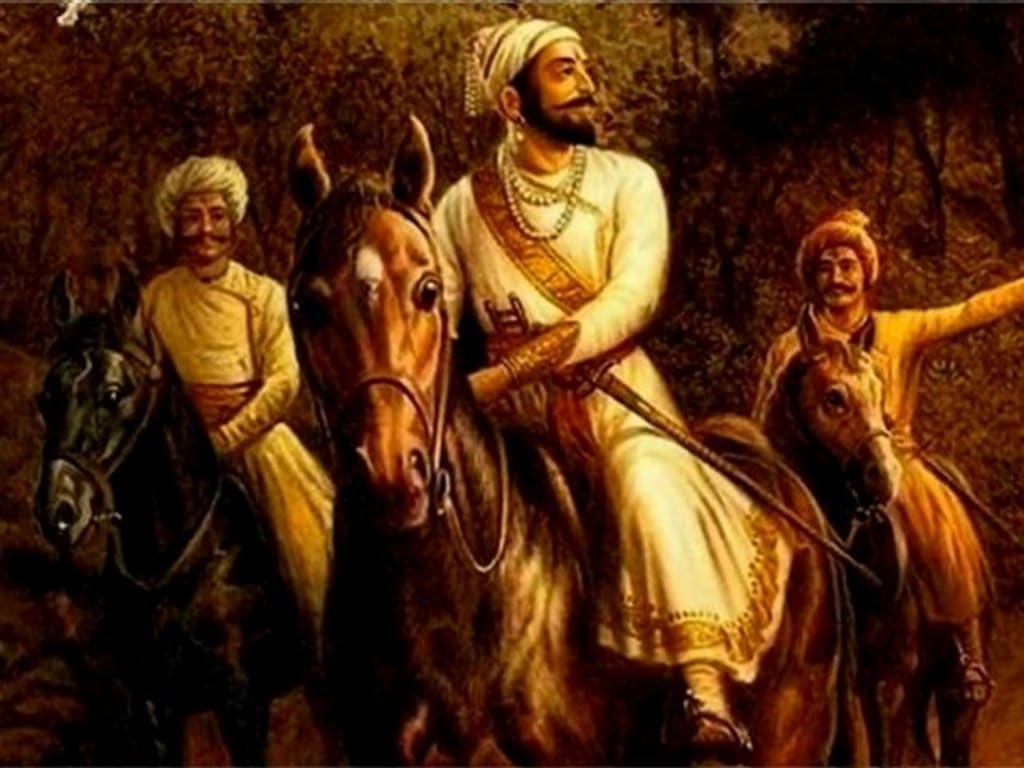Chhatrapati Shivaji Maharaj: The Visionary Architect of the Maratha Empire
Uniting a Nation, Defying Empires, Inspiring Generations

Introduction:
In the rich tapestry of Indian history, few figures shine as brightly as Chhatrapati Shivaji Maharaj. Born in the early 17th century, Shivaji’s life was a testament to courage, resilience, and the indomitable spirit of the human soul. From humble beginnings to the pinnacle of power, his journey is a saga of conquest, triumph, and the relentless pursuit of freedom.
Early Life and Background:
Shivaji was born around 1627 or 1630 into the illustrious Bhonsle clan, a noble family with a long lineage of warriors and statesmen. His father, Shahaji Bhonsle, was a respected military commander, while his mother, Jijabai, was a woman of strong convictions and unwavering faith. Raised amidst the rugged terrain of the Western Ghats, Shivaji’s upbringing was marked by tales of heroism, sacrifice, and the struggle against tyranny.
From a young age, Shivaji displayed a keen intellect and a thirst for adventure. He was deeply influenced by the stories of valor and bravery recounted by his mother and the tales of past glory that echoed through the hills and valleys of his homeland. These early experiences shaped his character and instilled in him a sense of duty towards his people and his land.
The Rise of a Leader:
Shivaji’s first taste of military success came at the age of sixteen when he captured the Torna Fort from the Adil Shahi forces. This daring act of defiance marked the beginning of his quest to establish a sovereign Maratha kingdom. Over the years, Shivaji honed his military skills and expanded his territory through a series of strategic alliances and bold campaigns.
One of Shivaji’s most remarkable achievements was the establishment of the Maratha navy, which played a crucial role in securing the coastline and protecting his kingdom from external threats. Under his leadership, the Marathas emerged as a formidable maritime power, challenging the dominance of the Portuguese and other European colonial powers in the region.
In 1674, Shivaji achieved his greatest triumph by crowning himself Chhatrapati, or “Supreme Sovereign,” of the Maratha Empire. This coronation marked the culmination of years of struggle and sacrifice and heralded a new era of prosperity and stability for the Maratha people.
The Administration of Shivaji Maharaj:
As Chhatrapati, Shivaji implemented a series of administrative reforms aimed at promoting justice, equality, and religious tolerance. He abolished unjust taxes, reformed the revenue system, and encouraged trade and commerce within his kingdom. Shivaji also established a network of forts and fortifications to defend his territory and maintain law and order.
One of the most enduring legacies of Shivaji’s rule was his commitment to religious freedom and tolerance. Despite being a devout Hindu, Shivaji respected the rights of people of all faiths and ensured that they were treated with dignity and respect. He patronized scholars, poets, and artists from diverse backgrounds, fostering a spirit of cultural exchange and mutual understanding.
The Challenges and Triumphs:
Shivaji’s reign was not without its share of challenges. He faced numerous battles against the mighty Mughal Empire, led by the formidable Aurangzeb. Despite being outnumbered and outmatched, Shivaji’s military genius and guerilla tactics enabled him to hold his own against the Mughal forces and secure his kingdom’s independence.
One of Shivaji’s most famous victories came in 1666 when he launched a daring raid on the Mughal city of Surat, plundering its riches and humiliating its defenders. This audacious act not only bolstered Shivaji’s reputation as a fearless warrior but also demonstrated his ability to strike fear into the hearts of his enemies.
Legacy and Influence:
Shivaji’s legacy extends far beyond the borders of his empire. He is revered as a symbol of resistance and defiance, a hero who stood up against injustice and oppression. His ideals of self-governance and sovereignty continue to inspire people across India and beyond, serving as a reminder of the power of courage, determination, and perseverance in the face of adversity.
Even today, Shivaji’s memory is celebrated with fervor and reverence in Maharashtra and beyond. His statues and monuments dot the landscape, while his name adorns streets, schools, and public buildings across the country. From humble beginnings to the heights of power, Shivaji Maharaj remains an enduring symbol of hope and inspiration for millions.
Conclusion:
In conclusion, Chhatrapati Shivaji Maharaj was more than just a king; he was a visionary leader, a fearless warrior, and a true son of the soil. His life story serves as a timeless reminder of the power of determination, courage, and perseverance in the face of adversity. As we honor his memory and celebrate his achievements, let us draw inspiration from his example and strive to emulate his noble ideals in our own lives. For in the words of Shivaji himself, “A man becomes great by deeds, not by birth.”
About the Creator
Avhishek Agarwal
Avhishek Agarwal - five-year veteran article and content writer. creating engrossing stories with elegance and accuracy. #Writer #ContentCreator






Comments (1)
Its been good to have this story on thus platform